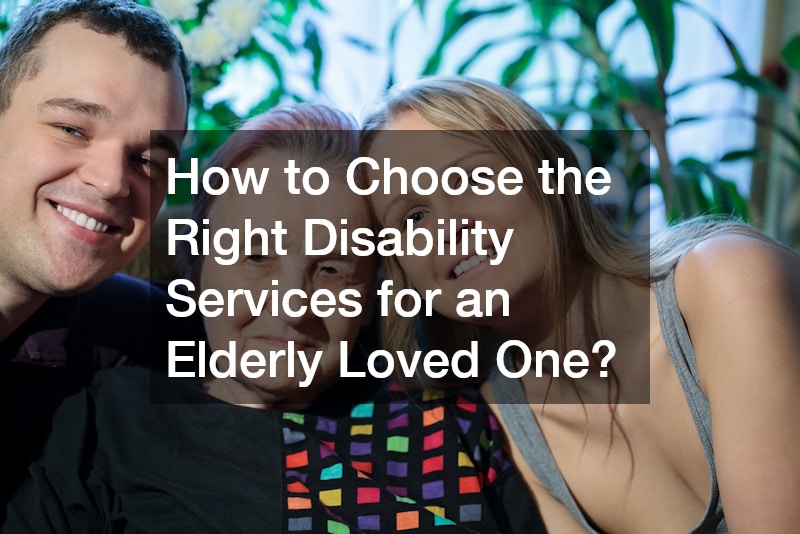Understanding the importance and advantages of disability services can greatly enhance the quality of life for elderly loved ones. These services are designed to provide support and facilitate their independence. This article will explore common questions and topics that arise when considering disability services for seniors.
What Types of Disability Services are Available for the Elderly?
In-Home Care Services
In-home care services are tailored to meet the specific needs of elderly individuals within the comfort of their homes. These services range from medical assistance to personal care, ensuring that seniors receive comprehensive support without leaving their familiar environment.
By providing in-home care, healthcare professionals are able to monitor the well-being of elderly loved ones closely. This approach not only helps prevent emergency hospital visits but also offers peace of mind to family members.
Such services often include assistance with daily activities like bathing, dressing, and meal preparation. Through these convenient solutions, seniors can maintain their dignity and independence while aging in place.
Community-Based Programs
Community-based programs offer diverse opportunities for elderly individuals to engage with peers and participate in activities that promote social interaction and personal growth. These programs are instrumental in building a supportive network for seniors, fostering a sense of belonging and community.
Recreational activities and educational workshops are common features of community-based programs. They not only keep seniors active and engaged but also help them acquire new skills and hobbies.
Local organizations often collaborate to provide a variety of free or low-cost services that address the various needs of seniors. Accessibility and inclusivity are central elements, ensuring all individuals can benefit from these valuable programs.
How Do Disability Services Improve Quality of Life?
Enhanced Mobility and Independence
Disability services play a critical role in enhancing mobility among seniors by offering physiotherapy, mobility aids, and exercise programs. These resources enable elderly individuals to maintain physical strength and autonomy, reducing the risk of falls and injuries.
By improving mobility, seniors can continue to participate in daily tasks and maintain active lifestyles, which is crucial for their overall well-being. This independence allows them to engage more fully in community and family life.
Additionally, disability services frequently provide transportation solutions, ensuring that seniors can travel to medical appointments and social events. This accessibility helps reinforce their sense of independence and reduces isolation.
Mental and Emotional Well-Being
Mental health services are essential components of disability services, offering counseling and therapy to support the psychological needs of seniors. These services address issues like depression and anxiety, improving the emotional resilience of the elderly.
Programs focused on cognitive stimulation and memory care are equally vital, helping to slow the progression of age-related cognitive decline. Engaging in mentally stimulating activities can significantly enhance a senior’s quality of life.
Social support groups and community resources are also available to assist with emotional well-being. By fostering connections and providing outlets for expression, these services counteract loneliness and promote happiness in seniors.
Are There Financial Aids Available for These Services?
Government Assistance Programs
Government assistance programs play a significant role in alleviating the financial burden associated with disability services for seniors. These programs, such as Medicare and Medicaid, provide essential funding and resources to eligible individuals.
In addition to federal programs, many states offer specific benefits tailored to support the healthcare needs of elderly residents. These encompass a wide range of services, from medical care to home adaptations, to ensure comprehensive support for all.
Families must explore these options early and apply promptly, as eligibility and availability can vary widely. Understanding the nuances of these programs can lead to significant financial relief and better service access.
Non-Profit and Charitable Organizations
Non-profit and charitable organizations are invaluable allies in providing financial aid for disability services. They often bridge gaps in funding that governmental programs might not cover, ensuring no senior is left without necessary support.
Many organizations offer grants, subsidized services, or donate mobility aids directly to the elderly. Their contributions play a pivotal role in enhancing the well-being of those who might otherwise struggle to afford such aids.
Furthermore, collaborations between non-profits and community resources can offer additional benefits and discounts. Engaging with local charities can open doors to a network of support, enriching the lives of seniors.
How to Choose the Right Disability Services for an Elderly Loved One?
Assessing Individual Needs
Choosing the appropriate disability services begins with a thorough assessment of the specific needs and preferences of your elderly loved one. This includes evaluating their physical, mental, and emotional health to determine the most suitable support options.
It’s important to involve your loved one in these conversations to ensure their desires and comfort levels are prioritized. By doing this, you are more likely to select services that align with their daily lifestyle and long-term goals.
Family members may wish to consult with healthcare professionals or social workers during this process. Their expertise can guide families in making informed decisions about the best care strategies for seniors.
Researching and Evaluating Service Providers
Once needs are assessed, the next step is researching potential service providers. Ensure that they have a strong reputation and are licensed or accredited by relevant authorities.
It is beneficial to read reviews and seek recommendations from other families or professionals who have had experience with these providers. A thorough vetting process ensures you select a reliable service that meets the required standards of care.
Consider visiting the facilities or requesting meetings to better understand their approach and resources. An informed decision will contribute to peace of mind, knowing your loved one is receiving quality care.
